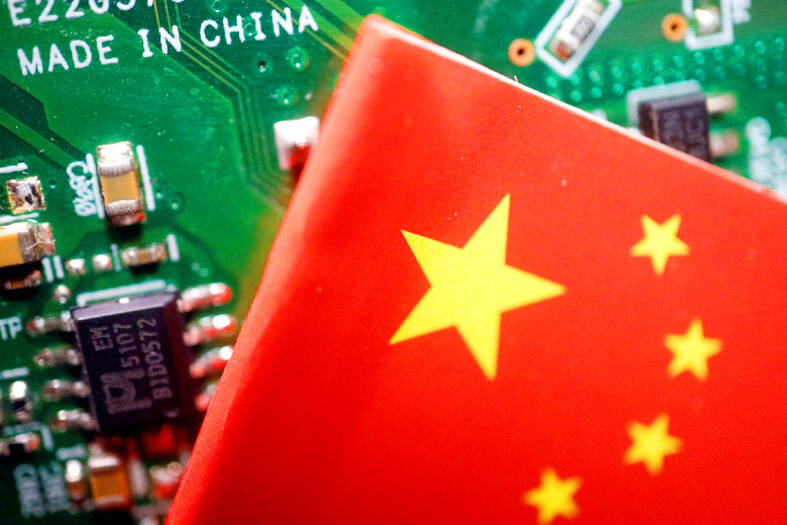Amendments to the National Security Act (國家安全法) imposing harsher punishments for “economic espionage” and “extraterritorial use of national core key technologies’ trade secrets,” which were passed last year, have taken effect, with offenders facing up to 12 years in prison, the Executive Yuan announced yesterday.
The revisions took effect following the National Science and Technology Council’s release on Tuesday last week of a list of 22 national core key technologies.
To protect Taiwan’s high-tech industries, the Legislative Yuan passed a third reading of the amendments to the National Security Act in May last year.

Photo: Reuters
With their implementation being delayed for more than a year, the Taiwan Statebuilding Party held a news conference calling for their enactment.
The 22 national core key technologies listed by the council cover five industries: national defense, aerospace, agriculture, semiconductors and information security.
The core key technologies include eight types of technologies in the aerospace industry, and 14-nanometer and more advanced semiconductor processes and heterogeneous integrated packaging technology in the chip industry.
The council is expected to release a second list of national core key technologies in March or April next year.
The amendments impose stiffer penalties for those who help China, Hong Kong, Macau or foreign hostile forces obtain, use, or leak trade secrets of Taiwan’s core key technologies, through theft, cheating, coercion or reproduction without authorization.
Offenders may face five to 12 years in prison or a fine of NT$5 million to NT$100 million (US$158,670 to US$3.17 million).
People convicted of economic espionage may face the same punishments, with the amendments defining three types of criminal behavior: knowing or holding trade secrets of national core key technologies, but reproducing, using or leaking them beyond the scope of authorization or without authorization; holding trade secrets of national core key technologies despite being informed by the owner to delete or destroy them; and being fully aware that other people obtained trade secrets of national core key technologies through the situations stated above, but still obtaining, using or leaking the trade secrets.
The “extraterritorial use of national core key technologies’ trade secrets” refers to the illegal use of trade secrets of national core key technologies in China, Hong Kong, Macau or other countries. Offenders may face three to 10 years in prison or a fine of NT$5 million to NT$50 million. Those found guilty of attempting to commit such acts would also be punished.
The amendments also stipulate that current or retired military officials, civil servants, educators, or public-sector employees who commit such acts would lose their rights to retirement benefits, while those who have received them would be asked to pay the amount back.
In other developments, Minister of National Defense Chiu Kuo-cheng (邱國正) said allegations that National Defense University professor Ger Ming-der(葛明德) had set up a company that conducts technical cooperations with China would be a case of “betraying the country.”
It would be considered treason and should be dealt with according to the law and severely punished, he said in response to lawmakers’ queries at a meeting of the legislature’s Foreign Affairs and National Defense Committee.
The Ministry of National Defense would also engage in introspection over the case, Chiu said, adding that an administrative investigation is underway.
Additional reporting by staff writer

SECURITY: As China is ‘reshaping’ Hong Kong’s population, Taiwan must raise the eligibility threshold for applications from Hong Kongers, Chiu Chui-cheng said When Hong Kong and Macau citizens apply for residency in Taiwan, it would be under a new category that includes a “national security observation period,” Mainland Affairs Council (MAC) Minister Chiu Chui-cheng (邱垂正) said yesterday. President William Lai (賴清德) on March 13 announced 17 strategies to counter China’s aggression toward Taiwan, including incorporating national security considerations into the review process for residency applications from Hong Kong and Macau citizens. The situation in Hong Kong is constantly changing, Chiu said to media yesterday on the sidelines of the Taipei Technology Run hosted by the Taipei Neihu Technology Park Development Association. With

CARROT AND STICK: While unrelenting in its military threats, China attracted nearly 40,000 Taiwanese to over 400 business events last year Nearly 40,000 Taiwanese last year joined industry events in China, such as conferences and trade fairs, supported by the Chinese government, a study showed yesterday, as Beijing ramps up a charm offensive toward Taipei alongside military pressure. China has long taken a carrot-and-stick approach to Taiwan, threatening it with the prospect of military action while reaching out to those it believes are amenable to Beijing’s point of view. Taiwanese security officials are wary of what they see as Beijing’s influence campaigns to sway public opinion after Taipei and Beijing gradually resumed travel links halted by the COVID-19 pandemic, but the scale of

A US Marine Corps regiment equipped with Naval Strike Missiles (NSM) is set to participate in the upcoming Balikatan 25 exercise in the Luzon Strait, marking the system’s first-ever deployment in the Philippines. US and Philippine officials have separately confirmed that the Navy Marine Expeditionary Ship Interdiction System (NMESIS) — the mobile launch platform for the Naval Strike Missile — would take part in the joint exercise. The missiles are being deployed to “a strategic first island chain chokepoint” in the waters between Taiwan proper and the Philippines, US-based Naval News reported. “The Luzon Strait and Bashi Channel represent a critical access

Pope Francis is be laid to rest on Saturday after lying in state for three days in St Peter’s Basilica, where the faithful are expected to flock to pay their respects to history’s first Latin American pontiff. The cardinals met yesterday in the Vatican’s synod hall to chart the next steps before a conclave begins to choose Francis’ successor, as condolences poured in from around the world. According to current norms, the conclave must begin between May 5 and 10. The cardinals set the funeral for Saturday at 10am in St Peter’s Square, to be celebrated by the dean of the College